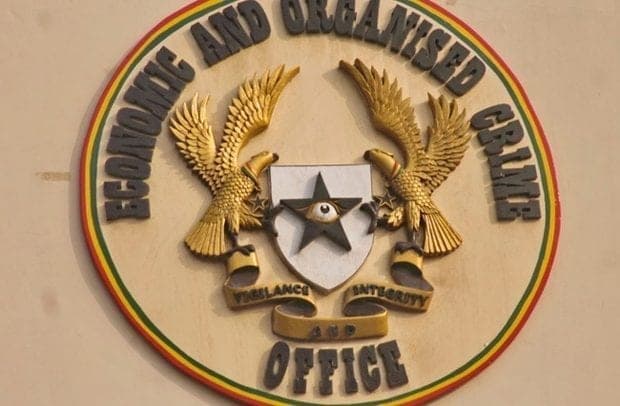Head of Legal and Prosecution at the Economic and Organised Crime Office (EOCO), Leo Anthony Siamah, has rejected claims that the agency operates in “rambo-style” by randomly stopping cars on the road in its fight against stolen vehicles in Ghana.
Mr. Siamah explained that EOCO relies on a database that helps track garages and dealerships during asset investigations.
“Out of the 300, we were able to recover about 66. But what is worrying is that more than 70 percent of vehicles we intercepted outside the original list also turned out to be stolen. This shows the problem is much bigger, with some estimates suggesting up to 10,000 stolen vehicles may be entering Ghana each year,” he said on The Key Points on TV3, Saturday, August 23.
He emphasized that EOCO does not randomly stop vehicles but instead traces them through data and investigations. “Most of the 66 vehicles recovered were traced to garages where they were being sold,” he noted.
On how the public can protect themselves, Mr. Siamah advised buyers to go beyond surface checks when purchasing vehicles.
“If you do not do proper due diligence, the law does not give you any cause of action against the person who sold you a stolen vehicle. So, you need to take extra steps,” he cautioned.
He further urged all car buyers to check with INTERPOL or EOCO to confirm that vehicles are not stolen before making payments. He stressed that the fact that duty has been paid on a vehicle does not legitimize the transaction.
“The fact that duty has been paid on a vehicle does not legitimize the transaction. We urge buyers to check with INTERPOL or EOCO before proceeding to buy vehicles abroad,” he reiterated.
EOCO has flagged Honda CR-Vs, Ford F-150 pickups, Range Rovers, and Dodge models as the most common vehicles under suspicion in its crackdown on stolen cars trafficked into Ghana.
INTERPOL has long identified Ghana as a growing hub for stolen vehicles, particularly from Canada and the United States. EOCO’s operations confirm that these four brands account for the majority of intercepted cases.
Mr. Siamah cautioned prospective buyers to exercise vigilance when dealing with these models.
“There are certain types of vehicles that are suspicious. For instance, the Honda CR-V series, the Ford F-150, the Range Rover, and the Dodge Ram. These are four brands that are very high in terms of the number of stolen vehicles we recover. Most of them happen to be these vehicles. So, obviously, if you are going to purchase one of those vehicles, that should be a red flag for you,” he explained.
Red Flags for Buyers
He also advised car buyers to be cautious of vehicles that appear “too new and accident-free,” especially 2023 and 2024 models.
Ghana’s market typically deals in salvaged or accident-damaged imports, making the sudden influx of spotless, newer cars highly suspicious.
“If you look at one of those vehicles that was recently released maybe a 2023 or 2024 model that is accident-free — it should be a red flag. That should prompt you to check with INTERPOL to verify whether the car is stolen,” he advised.
While Honda CR-Vs, Range Rovers, Ford F-150s, and Dodge Rams top the list, EOCO clarified that its operations are not limited to these models.
“Would you go after a Toyota Corolla, for instance? Yes. We’ve gone after a couple of Toyota Highlanders and Honda Accords. So, it’s not like we have a preference,” Mr. Siamah said.
EOCO is urging the public to take advantage of INTERPOL’s database and other verification systems before buying vehicles, stressing that due diligence remains the best safeguard against purchasing stolen cars.


1 Comment
https://shorturl.fm/Yyw1E